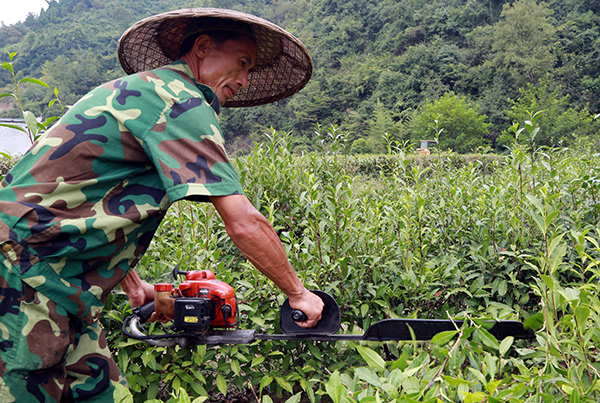|
 Zhang Caihong, a tea plantation owner, trims tea bushes in the Xiangxi Tujia-Miao autonomous prefecture, Hunan province. |
One of the drawbacks of mass urbanization is the issue of those left behind. Migrant workers are separated from their families for long periods, which results in villages full of unattended children and seniors.
To counter this, the Labor Service Cooperation Initiative emphasized a solution: developing local enterprises so workers could find stable employment near their homes.
To emphasize precision poverty relief, the enterprises have to take advantage of their unique environmental and labor conditions, turning disadvantages into strengths.
In the past five years, droughts have consistently ravaged Yunxi county, Hubei province, devastating its cash crop industry. However, the county has perfect conditions for the cultivation of tie sao zhu, also known as "iron broom", a drought resistant plant used to make brooms.
Last year, Hu Chaozhu, the owner of a broom-making company, took a loan of 100,000 yuan ($67,000) from the local government to form the Hengda Broom Specialized Cooperative.
For Hu, the decision made perfect economic sense. "I outsource the plantation to local farmers and buy the raw materials from them," he said. "This saves me so much in terms of planting and transportation costs that I could still make a profit even if I paid slightly more than the market price."
Since making brooms requires no advanced skills, Hu has hired more 300 local left-behind women, seniors and people with disabilities. "There is no quota. The more you make, the more you earn," he said.
Jia Rongshan, a 52-year-old man with congenital kyphosis, a severe spinal deformity, expects to make 8,000 yuan by the end of the year, nearly twice the official provincial poverty level of 4,100 yuan. Wang Jiaxue, a disabled 46-year-old, will make 14,000 yuan from manual labor and selling raw materials.
A similar story occurred in Aikou, a village in Hunan's Xiangxi Tujia-Miao autonomous prefecture. Although its mountainous location means there is little space for large-scale agriculture or manufacturing, its clear air and clean water make the village an ideal spot for tea plantations.
In 2009, the first Aikou Village Specialized Tea Cooperative was established. Through professional training and collective management, the cooperative has flourished and helped local people find a route out of poverty.
Zhang Caihong is one of them. The 54-year-old now owns 1.2 hectares of tea plantations and earns more than 54,000 yuan a year, enough to put his son through Jimei University in Xiamen, Fujian province. "My days of poverty are over," he said.
Last year, the cooperative received a grant of 4.46 million yuan from the treasury and office of poverty alleviation in Jishou, the capital of Xiangxi, to jump-start a 37.5-hectare tea plantation designed to raise the living standards of 280 designated "impoverished" workers. In addition, the cooperative hires more than 200 temporary workers for 150 days every year, with each worker earning 12,000 yuan.
Wang Lupu, deputy director of the Hunan administration of employment services, said the businesses best suited to poverty alleviation are those that employ large local manual labor forces to create a unique and marketable product.
